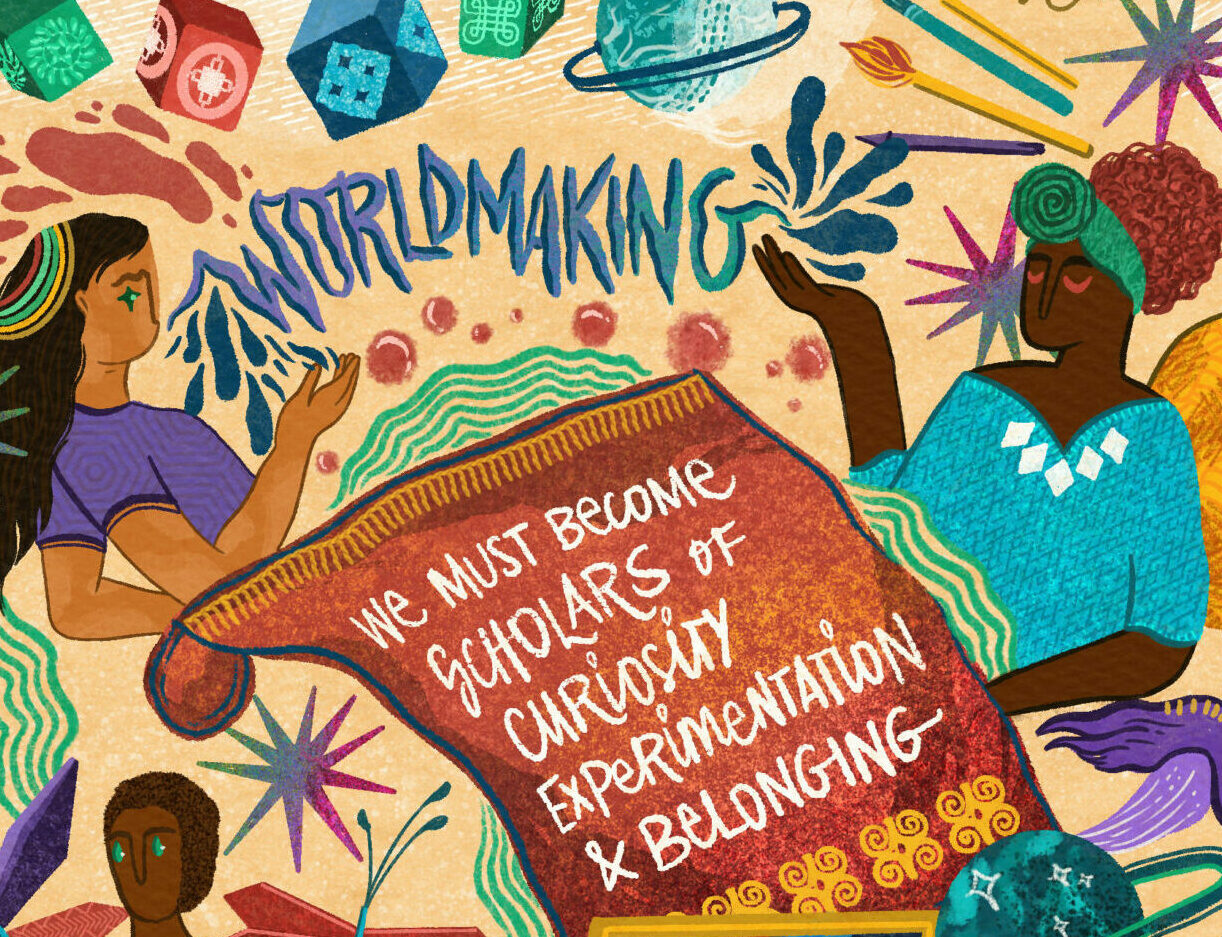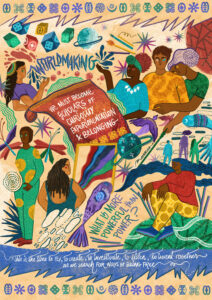



A riddle: What is more powerful than power?
As the oceans boil, and the hurricanes beat violently against our shores, and the air sweats with the heat of impending doom, and our fists protest the denial of who and what we are, there is a path to take that has nothing to do with victory or defeat: a place we do not yet know the coordinates to; a question we do not yet know how to ask. There are things we must do, sayings we must say, thoughts we must think, that look nothing like the images of success that have so thoroughly possessed our visions of liberation and justice.
May this time be remembered as the time of the strange path, of the different way, of the broken binary, of the traversal disruption, the kairotic moment, the movement for emancipation, the gift of disorientation that opens up new places of power. You have a right to dream. May time bring more than just solutions, more than a just and equitable future – may it bring words we don’t know yet, and temporalities we have not yet inhabited. May we be slower than speed could calculate, and swifter than the pull of the gravity of words can incarcerate. And may we be visited so thoroughly, and met in wild places so overwhelmingly, that we are left undone. Ready for composting. Ready for the impossible.
This is the time to fly, to create, to investigate, to listen, to invent together.

In doing this work it is important to think for a moment about the place of play in making visions of a racially just world. Something that we are not usually invited to do. We normalise oppressions in the everyday as a way of surviving. We fall and are pushed into grooves of forgetting that things can be different. We get invisibilized, energy levels get depleted, we get worn down, we find ourselves in running battles with the hegemonic system and this makes us forget to imagine and dream, we are made to forget that things could be different. This way of being, where we are co-opted into normalising our oppression, seeps into how we think about time, how we produce knowledge, how we create politics, and, yes, into how we play, or forget to play. If we leave play out of our efforts of worldmaking, our efforts will be fundamentally incomplete, and perhaps fatally so. Could we really imagine a liberated future, and not include liberated play? Could we really create liberating practices in the everyday, without fun and games?
Making play part of worldmaking is not just necessary for the sake of completeness. Games have benefits in and of themselves that are not as readily accessible through other methods. A simulation, like a game, has the potential to disrupt because it takes people outside of the real world and puts them into an imaginary space. In this imaginary space we are able to accept a different set of premises about what is possible – what worlds and ways of relating are possible. It is not a reactive reality; it does not negate reality but it helps us transcend it. The invisible power, the power of being socialised into the Master’s House of oppressive systems has ways of corralling and limiting the imagination. What is the imaginative leap we need to make as part of world making? We cannot know this fully in advance. We need to get ourselves into a state of radical imagination, (Black Panther; Black Futures Freedom summer; Fearless Futures; A Message From the Future) and play is indispensable to that.
Task: Be revolutionary. You have a right to dream
Need: The changes we are responsible for shaping are profound. When we can see the violence that comes with privilege and the end of all beings on the horizon, we must operate at a scale that extends our life beyond the horizon. Futurism is a thrilling arena. An arena where, Black people, Brown people, Indigenous people, poor people, queer people are saying “We were almost erased from history, but we are writing ourselves back in. We’re creating stories that are rooted in our heritage and that articulate an equitable, caring and just, life giving future, free from violence.”
Mantra: The past is a resource not a destination.
Context: We don’t have a clear sense of the exact solutions to fix the future, we should have a clear sense of how we want to feel in ourselves, in our relationships with each other, in community, and in relationship to the planet. Those feelings aren’t for the far-off future, they are guidance to what we must be seeding and practicing now, right now.
Practice: We must become scholars of curiosity, experimentation and belonging. Belonging begins with finding resonance with others, recognizing ourselves in them both in our collective experience and then reclaiming our humanity as people who have been dehumanized. This is powerful and radical. Separation weakens. Where we are born into privilege, we are charged with dismantling any myth and structures of supremacy. Where we are born into struggle, we are charged with claiming our dignity, joy, and liberation and acting in support and solidarity of full liberation. We need a vision of us where we win. A vision not rooted in a lack of investment.
* * * *
Task: Care for ourselves, each other and our planet.
Need: This is a world of wonder and wounds. Both are always with us. If we ignore the wonder, we become the oppressor or we lose our will to live. If we ignore the wounds, they fester into the violence of unspoken needs and inhumane practices.
Mantra: As oppressed people we are each other’s medicine.
Context: We must be clear that radical care for our community and the planet is a fundamental piece of any future we will build. This doesn’t displace struggle, critique, or conflict, but rather deepens and softens these necessary human experiences, makes them part of belonging instead of a precursor to exile. Remember supremacy is rooted in domination, enforced by violence and justified by hatred of the other.
Practice: Question any strategies that don’t account for care. Especially when such strategies are housed in the work of reforming existing oppression, making it slightly less harmful. That is not care, it’s complicity. Move towards spaces that value us, let ourselves belong to those communities that know they want us, know they need us, know we have worth, know we deserve more than transactional care. It is from this space we find space to grow our power.
* * * *
Task: Relinquish borders and nation-being.
Need: Being in right relationship with the Earth is of primary importance, and it is not done in divided groups but as a species. The world predates all nation, all concept of nation, all longing for nation, all borders, all dichotomies, all division, all superiority. The world is life moving always towards life and if nation moves in a different direction then nation shall not last.
Mantra: Never confuse saving a nation with being in right relationship with the world.
Context: “Queer” is framed as an identity. And it is – on the surface of things. By framing “queer” as yet another identity down the list of identities, it compels a battle for room in the hegemonic machine. Queer becomes codified as the opposite of “straight”, a choice for the discerning white supremacist, capitalist unit. But beyond this machine, queer is not the opposite of straight, but its conditionality; queer is the undoing of straight, the refusal for straight to be as straight as it purports to be. Other arrangements are possible, other rituals for holding “what we are” not as existential fixtures, but in tension with the fugitivity of what we are becoming.
Practice: Search for the ways of being free. Make the distinction between boundaries and borders. Imagine that there is enough. Remember you are made of the visions and commitments of your ancestors, of stardust, dreams, and, each day more and more, memory. Shape your life from that raw material of the miraculous, and trust your place in the grand story of liberation rather than the shackles that bind us.
* * * *
A reminder!
Warning: We must understand it is advanced work to wield any master’s tools – most of the time we become the shape we shift into, we forget why we entered the big house, and that we still come and go through the back door. We cannot dabble in reformist work under the guise of revolution, of remaking the world. We must be looking directly at the ways oppression has coiled itself at the stem of our work for social justice. We must seek comprehensive change from the roots of the world to the sky. Always rejecting must be understood as compliance with oppression and, perhaps, a terror of freedom.
Possibility: It is ok to be afraid. It is logical. We were just slaves and slave owners a minute ago. We were just segregated a few seconds ago. Both of those systems morphed without dying; they live on in us, in practice. It is daunting to carry the dream of freedom in an imprisoned body. It is terrifying to truly face the vast scope of heartbreak and othering that permeates our world. We must know the uses of anger.
Agility: To fight does not always mean to move against. It also means we need to be investing our energy, attention and resources in generating alternative and sustainable methods of supporting our work. It means we must be focused, flexible and agile. Our attention is as precious and precise as sunlight. If we put it on each other’s flaws, we can burn each other out of existence. But if we put it on the best of us, on the lessons, on the children, on our liberatory ways of knowing, of being and practices – we will co-create and grow something different.
Practice: We are fractals. A microcosm of the macro. Know the difference between fighting an enemy and struggling with a comrade. We must be capable of complex navigation and cohabitation, or we will ruin the possibility of life. We cannot change others, but we can be honest with each other, and celebrate the work we do to change ourselves. Remember we are interconnected. Feel pleasure every day. Don’t let your body, your heart, or your mind forget why we fight – to feel aliveness and togetherness – to make different and new worlds and ways which we will grow.
By Shereen Essof, Executive Director, JASS
* * * *
Illustration by Sonaksha Iyengar.